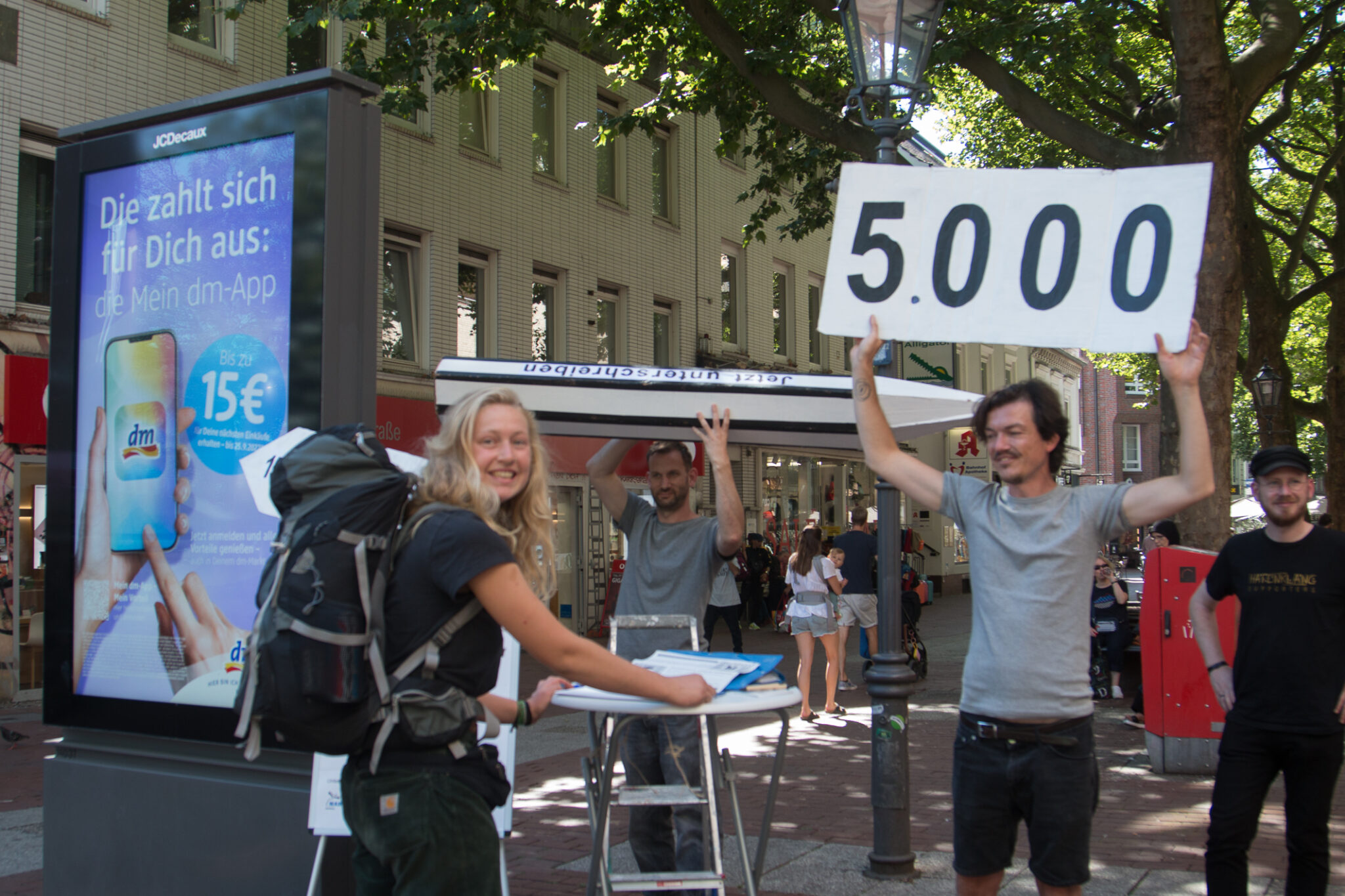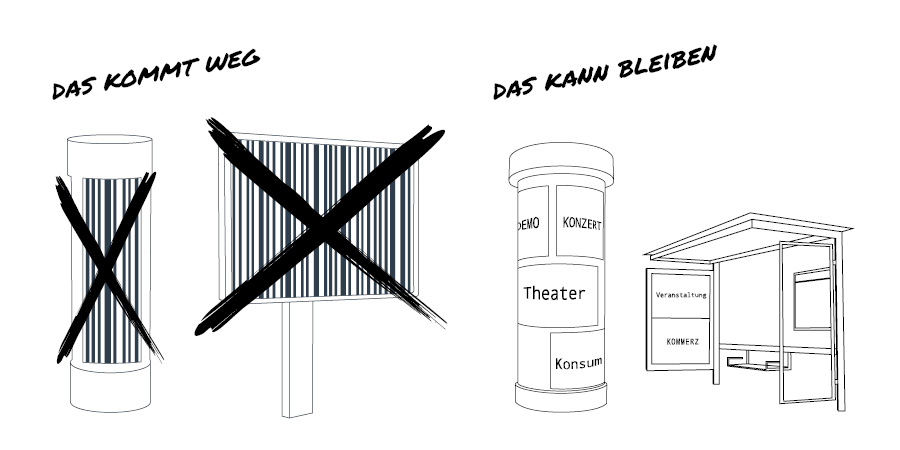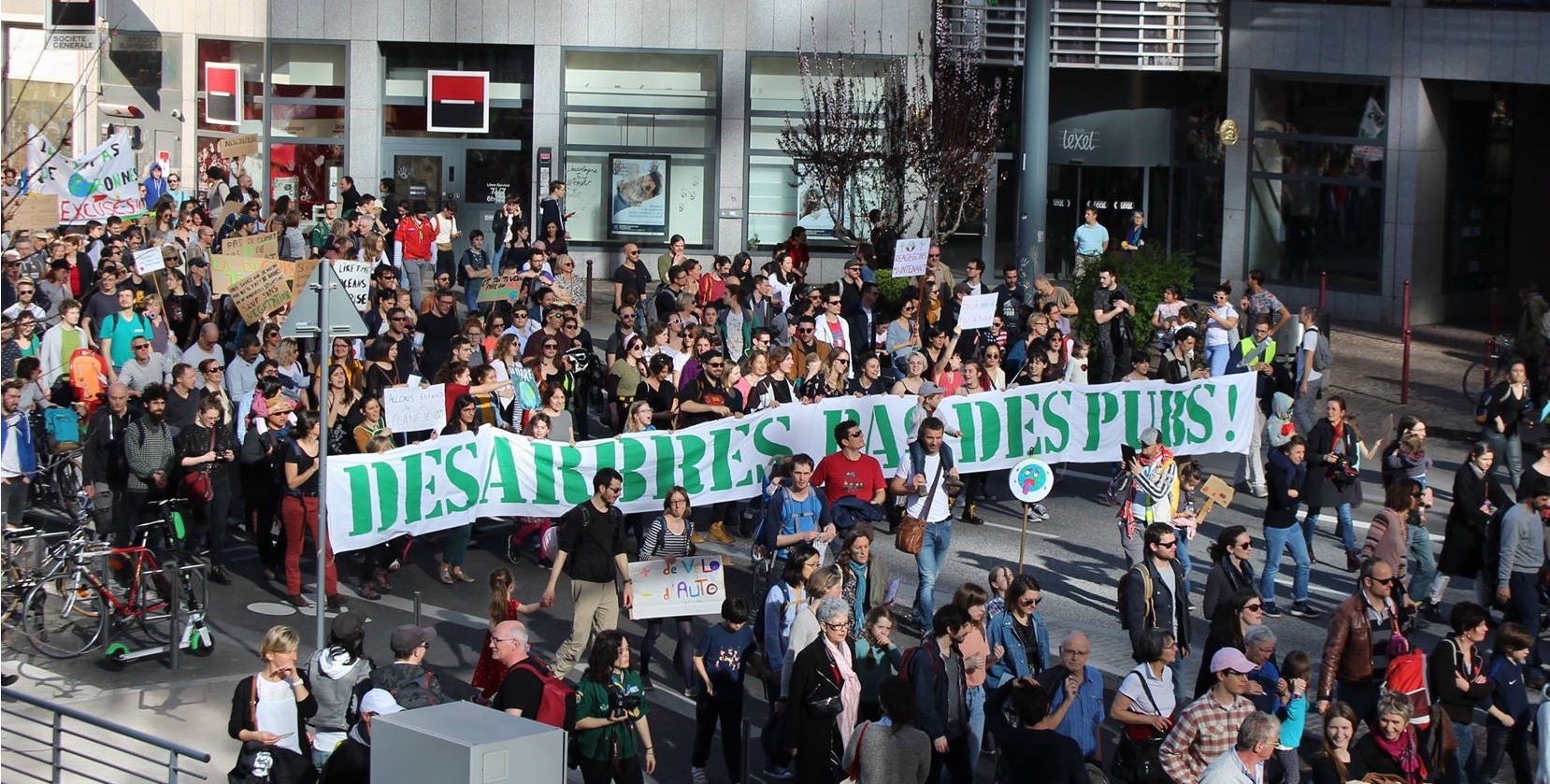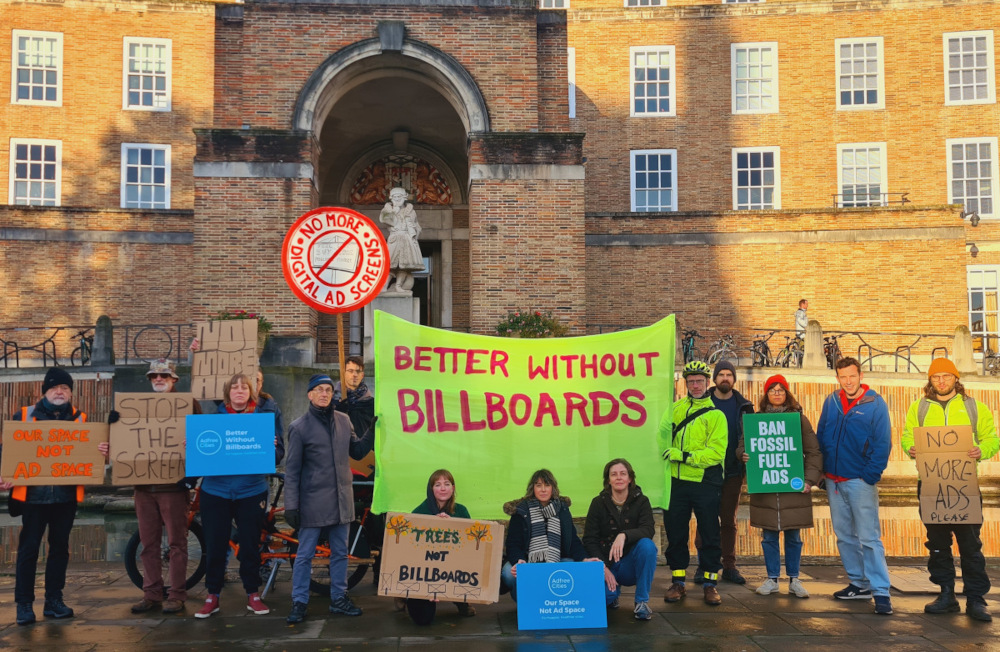Around 400 campaigners have begun collecting petition signatures in Hamburg, Germany in support of a proposed new law to remove digital advertising screens from the city. The campaigners aim to hold a full referendum of Germany’s second largest city later this year to reduce outdoor advertising, citing the disproportionate presence of commercial messages in public space and its impact on residents’ mental wellbeing and the climate.
In September 2024, the Hamburg Constitutional Court ruled that a proposed law from Hamburg Werbefrei (Adfree Hamburg) to reduce outdoor advertising was legally admissable – and that the group could proceed to collect 80,000 signatures (5% of the city’s electorate is needed) in order to conduct a full referendum later this year. The campaigners are granted permission to collect these signatures for a three week period between 23 April and 13 May 2025.


The key aspects of the proposed law in Hamburg are:
- Digital advertising systems are prohibited (with four exceptions)
- Advertising may not be illuminated from behind
- Advertising may have a maximum size of DinA0 (84cm x 119 cm)
- Half of the space must be used for event notices and non-commercial information
Update: 14th May 2025
Hamburg Werberfrei collected 50,796 signatures on paper from Hamburg residents during this period, which was short of the 80,000 signatures required. Nonetheless, the activists feel raised an important debate in the city and received alot of support despite the limited timeframe (3 weeks), the high amount of information required for each signature on the paper forms and a strong counter campaign from advertising companies on the city’s digital screens during the period.
Dr. Nils Erik Flick, confidant of Hamburg Werbefrei: “The many thousands of conversations that we have had all over the city in recent weeks have shown that we have hit a nerve. Even if it has not been enough in the end, the needs of these many people must not simply ignore the leaders. We would like to thank all Hamburg residents who have signed with us in the past three weeks. Despite everything, they have set an important signal.”
In January to May 2026, activists from Berlin Werbefrei will also beging to collect 250,000 signatures to call for a similar referendum. More information here: https://berlin-werbefrei.de/

Activists from European anti-advertising groups traveled to Germany during the week 6 – 11 May 2025 to show their support for the Hamburg Werbefrei initiative.
They state that the prospect of a referendum in Hamburg later is inspiring campaigners across Europe in reclaiming public space from the over dominance of corporate advertising. They will held a public event to celebrate recent success across Europe at Jupi Bar, Hamburg on 9 May 2025.

Residents across Europe are increasingly concerned about the health and environmental impacts of outdoor advertising in driving overconsumption, consumerism and pollution. Many city governments are taking action to remove and restrict the spread of new advertising billboards including Lyon, Grenoble (France), Zurich, Vernier (Switzerland), Bristol, London (England), Warsaw and Krakow (Poland). On 25 April 2025, a court in the Netherlands upheld the right of the municipal government in The Hague to ban advertising for high carbon products on all ad sites in the city via a local ordinance, following an unsuccessful legal challenge by airline TUI and the travel industry.
Given the size of Hamburg, the referendum initiative would be the biggest intervention against outdoor advertising in Europe.
There has been an upsurge in campaigning against outdoor advertising in the last decade as residents recognise the negative impacts of advertising on public health, the climate crisis and mental wellbeing.
Martin Weise from Hamburg Werbefrei said:
“We were never asked if we wanted to see hundreds of digital advertisement screens every day during our daily lives. This is our city; it doesn’t belong to Ströer and WallDecaux. Until May 13th, we have the opportunity to collect enough signatures to let the people decide for themselves whether they want this kind of advertisement or not.”
Matt John White from Adblock Norwich in England:
“I organise against corporate outdoor advertising because public space matters to me. We should be able to inhabit the streets where we live without being bombarded with constant adverts, for products that largely do us harm, touted by companies that do not really care about us. The advertising on our streets contributes to the ‘clone town’ effect: reducing the distinctiveness of our towns and cities, and making everywhere feel the same. At the same time it alienates the public, who see themselves more as consumers than as active citizens. Nobody would actively choose to have their streets littered with advertising: we deserve more dignity.”

Growing momentum
In Zurich, Switzerland, city officials voted in March 2025 to phase out digital advertising over the next 2 years. It follows a similar decisions in the municipality of Lancy and also Vernier next to Geneva, where councillors voted to remove three quarters of the town’s 172 billboards, including those on private land. Those remaining will be used solely for culture and sport ads. The city Geneva itself held a referendum on removing outdoor advertising in April 2023, which was narrowly defeated by 52% to 48% – with those in lower income neighbourhoods strongly voting in favour of the ban.
In Lyon, France city officials removed 120 advertising screens from the metro system in April 2024 citing them as “too aggressive” and “energy intensive”. The maximum size of other billboards in the city will also be reduced to 4 square metres. Grenoble became the first city in Europe to remove over 320 billboards in 2015.
In Warsaw and Krakow, Poland, city governments introduced new laws aimed at significantly reducing outdoor advertising media, including wrap around adverts on historic buildings and construction sites.
Research from England and Wales found that billboards are disproportionately concentrated in lower income neighbourhoods that also have higher levels of air pollution. 82% of billboards are located in the poorest areas. British campaigners are seeking a change in national planning laws to better protect communities from unwanted intrusive ad screens and a ban on advertising for junk food, gambling and environmentally-damaging products such as SUVs.
Municipal governments in Europe are also implementing climate measures to prohibit adverts for environmentally-damaging products such as fossil fuels, airlines and non-electric cars. Amsterdam, The Hague, Edinburgh, Sheffield, Stockholm and Gothenburg city region have all implemented restrictions in this area.
Robbie Gillett from Adfree Cities in England said:
“From Lisbon to Warsaw, Lyon to Hamburg, residents are organising to create happier, healthier and more sustainable cities across Europe. Advertising tells us a story. It shapes our dreams and desires. Instead of the things we need like affordable housing, clean air, public transport and social connection, advertising offers us big brands, polluting cars, junk food and fast fashion which damage our health, wellbeing and the environment. We must do better.”
Cha’ Ribaute from Résistance À L’Agression Publicitaire, France said:
“Advertising is the essential lever of our global capitalist system, which is on the brink of collapse and is putting up a shiny front to hide a world on its last legs. We need to question our imaginations and what we really want to see, hear or feel in our daily environment, in order to change our mindsets and our buying habits. We must refuse to let companies systematically impose their consumerist messages on us without asking for our consent.”
Charlotte Braat from Reclame Fossielvrij said:
“The misleading myths of the fossil industry must be banned, just as we banned tobacco ads. The last thing our health and environment need right now is the promotion of even more pollution and overconsumption. Cities have the responsibility to serve the people and reverse the uncontrolled growth of commercial influence in our public space.”
More information on the Hamburg referendum process and Constitional Court announcement in September 2024 is here (in english) and on the Hamburg Werbefrei site in german here.
Many groups campaigning against the advertising industry coordinate together through the The Subvertisers’ International.



